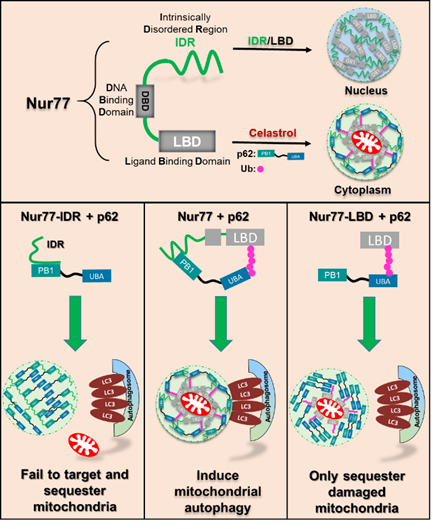On October 13, 2021, Professor Xiaokun Zhang’s research group from the School of Pharmaceutical Sciences of Xiamen University published their recent progress in Nature Communications as a featured article in the Webpage “From molecules and cells to organisms”. The paper describes their discovery that orphan nuclear receptor Nur77 can undergo phase separation to eliminate dysfunctional mitochondria via autophagy, which is highly relevant to aging.
Mitochondria, the “energy factory” of our body, play an integral role in cell death, autophagy, immunity and inflammation. The organelle is susceptible to damage, which is implicated in the development of aging and various diseases and cancer. Clearance of damaged mitochondria through autophagy (mitophagy) is therefore an attractive mechanism for mitochondrial quality control, representing an effective approach for drug development. Professor Zhang’s team has long-term interest in studying nuclear receptor regulation of mitochondrial function. In 2000, his team discovered and published in Science that, nuclear receptor Nur77 can translocate from the nucleus to mitochondria to regulate apoptosis, In 2017, they reported in their Molecular Cell paper that that celastrol, a potent anti-inflammatory pentacyclic triterpene isolated from Tripterygium Wilfordi (thunder god vine) plant, binds Nur77 to eliminate damaged mitochondria via mitophagy. However, the molecular mechanism underlying Nur77-mediated mitophagy remains unidentified.
In the current study, they discover that Nur77 upon celastrol binding undergoes complex liquid-liquid phase separation (LLPS) together with the autophagy receptor p62/SQSTM1 to selectively sequester damaged mitochondria and deliver them for degradation in lysosome. The results reveal a crucial role of LLPS in the mitophagic process, providing important mechanistic insight into mitophagy. The study also reveals a previously unrecognized role of N-terminal intrinsic disordered region presented in various nuclear receptor family members in phase separation, offering a new direction to study the diverse function of nuclear receptors. This also provides a new strategy to develop nuclear receptor-based therapeutics. In this context, their study unravels a critical role of Nur77/p62/SQSTM1-mediated mitophagy in aging, suggesting that celastrol and derivatives may be developed as therapeutics against aging-related diseases and cancer.

Ph.D. student Shuangzhou Peng and postdoctoral associate Xiaohui Chen serve as co-first authors of the paper. Dr, Ying Su from NucMito Pharmaceuticals participates in this study. The study was in part supported from funding from National Natural Science Foundation of China, Regional Demonstration of Marine Economy Innovative Development Project, Fujian Provincial Science & Technology Department Project, Xiamen Bureau of Science & Technology Project and the Postdoctoral Science Foundation of China.
Article Title: Phase separation of Nur77 mediates celastrol induced mitophagy by promoting the liquidity of p62/SQSTM1 condensates
Paper link: https://www.nature.com/articles/s41467-021-26295-8

